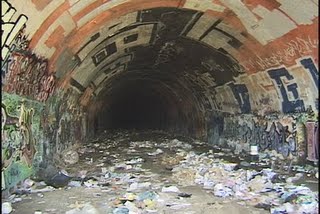JAMESTOWN FOUNDATION BLOG: Why Are the Russians Digging Tunnels in Abkhazia
By:

Following Russian Prime Minister Vladimir Putin’s visit to the occupied Georgian province of Abkhazia in late August 2008, the Kremlin appears to be intensifying its military preparations in the South Caucasus.
On September 4, Georgian newspapers and TV channels reported that “the Russian occupation forces have been engaged for two months in constructing a one-kilometer-long tunnel deep in the Ochamchire district. Allegedly, the construction is highly secretive, only Russian military are employed and the local residents are not even allowed to approach the construction site. The Russians will use the tunnel to deploy military equipment and munitions.”
Television station Rustavi 2 showed footage of the tunnel construction “clandestinely taken on a cell phone by a Sokhumi resident.” According to Rustavi 2’ “the Russian occupation forces have been engaged for two months in construction work and that 700 meters have already been dug through the mountains near the town of Tkvarcheli".
Georgian Public Broadcasting (GPB) reported that it is not one but several tunnels that the Russians are constructing near the towns of Ochamchire, Gulripshi and Tkvarcheli in the central and southern zones of occupation. The Russian military in some places are enlarging already existing tunnels leading to abandoned coal mines for “serious military purposes”.
The Georgian government has not commented on the Kremlin’s new construction activities and the Russian and Western media have not reported the story. It is difficult to speculate on the purpose of the tunnels, but the secretiveness of the construction leaves ample room for guessing.
Dr. Nodar Natadze, a Georgian scholar and a former member of the Georgian Parliament whose Popular Front played an important role in Georgia’s national liberation movement in the late 1980s and early 1990s thinks that the significance of the tunnels for the Russians cannot be overestimated.
On September 5, he gave an interview to iTV.ge, in which he presented two possible reasons for their construction.
“Russia is digging the tunnels in Abkhazia to deploy powerful, possibly, nuclear missiles there.” He based this assumption on the fact that “Russian naval forces are extremely weak in the Black Sea, having only one modern missile launcher Moskva.” Given this disadvantage, “Moscow would like to increase its offensive potential by deploying missiles along the Black Sea coast.”
Abkhazia’s geostrategic location, in Dr. Natadze’s words, is the primary reason why the Kremlin would like to use it as a missile base in addition to the North Caucasus where Russia already has missiles.
The second hypothesis Dr. Natadze mentioned was that the Russians might need “to use the tunnels to bury their nuclear waste.”
The international community has been largely silent about Russia’s illegal activities in Abkhazia and Tskhinvali. Although there is an EU Monitoring Mission in Georgia (EUMM), and its monitors are entitled under their mandate “to cover the entire territory of Georgia,” they are denied the opportunity by Russia to enter the occupied territories.
Given the prerogatives allowed by the mandate to monitor “the withdrawal of Russian and Georgian armed forces to the positions held prior to the outbreak of [August 2008] hostilities” and “to contribute to the stabilization and normalization of the situation in the areas affected by the war”, the EUMM and Brussels have the right to demand from the Russian side unfettered access to monitor the situation in the Georgian territories currently held by Russia, including Abkhazia and Tskhinvali.
If the Russians are indeed constructing tunnels for highly sensitive military deployments which could potentially alter the military balance in the South Caucasus, this should concern not only Georgia, but the entire international community, especially the United States and the European Union, which should express their concern and demand an explanation from Moscow.




